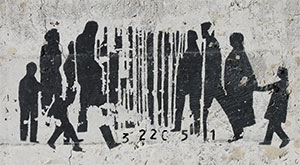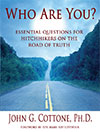|
|
|
I Am Not An Object … And Neither Are You
by John G. Cottone • Stony Brook, NY
 In our culture, when we hear the word “objectify” it is often within the context of women being treated as sex objects or in regard to slavery: the most egregious example of objectification in human history. Though troubling in their own right, these are just two examples of ways in which we all engage in the regular practice of objectification: using other people for our own benefit in a way that strips them of their humanity. Though we are not always aware of our objectifying tendencies, they can be extremely damaging to our culture, our relationships and our spiritual growth. In our culture, when we hear the word “objectify” it is often within the context of women being treated as sex objects or in regard to slavery: the most egregious example of objectification in human history. Though troubling in their own right, these are just two examples of ways in which we all engage in the regular practice of objectification: using other people for our own benefit in a way that strips them of their humanity. Though we are not always aware of our objectifying tendencies, they can be extremely damaging to our culture, our relationships and our spiritual growth.
To me, the most important spiritual book of the modern era is Martin Buber’s I and Thou. Buber, a Hassidic mystic, believed that the overwhelming majority of our human interactions bear some form of objectification, which often occurs without us even realizing it. Alternately, Buber suggests that we are capable of more benevolent interactions with others, which he termed “I-Thou” interactions: those in which we respect the independent destiny of others and thus refrain from using them primarily to satisfy our own needs. For Buber, we should strive to have I-Thou interactions because doing so will lead to healthier relationships and also because it will help us understand the nature of God.
Objectifying people isn’t just something that horny men do to dancers at strip clubs; it’s something that we all do, and often we do it most to the people we love. We objectify our kids, for instance, when we pressure them to succeed – playing the violin or hitting a baseball – because we want to realize our own dreams through their experiences. We objectify our spouses and romantic partners when we coerce them to satisfy our sexual desires, acquire us wealth, or fulfill household duties. Believe-it-or-not, we are also prone to objectifying ourselves, which occurs when we strive so hard to achieve a goal set by our ego (e.g., being promoted at work) that we purposely suppress any damaging physical or psychological consequences to ourselves that may result.
Though we are most likely to objectify the people closest to us, we also make a regular habit of objectifying acquaintances and strangers each day, like the individuals we pay for various services. In our culture, where “the customer is always right,” we have been trained to believe that if we are paying someone for a service – like the barista making our daily latte – we have the right to belittle her and complain when her performance is subpar, even if doing so results in her being fired. Though this tendency may be lauded by free market economists, there is a significant byproduct: it dehumanizes people and communicates to them that their only worth in society is as a dispenser of goods and services. When people feel this way, they not only become alienated from society but prone to objectifying people in their own lives.
Of course, corporations return the favor by objectifying us at every turn. In business, the term “race to the bottom” refers to the practice of doing whatever necessary to cut costs (and thus, maximize profits), even if doing so results in products that are unsafe (like toys with lead paint) or unreliable (like every cell phone I’ve ever owned). In this scenario, consumers are objectified as revenue sources whose safety and satisfaction are ignored until profits are affected, while workers are objectified as instruments of production in an environment where workplace safety and wage fairness are ignored until workers threaten to strike or are killed, like at the Foxconn manufacturing plant in China used by Apple and other tech companies.
Outside of the marketplace, perhaps the most common form of objectification comes from our habits in the sports realm. This is especially true when playing fantasy sports, where athletes are literally commodities that we “buy,” “sell” and “trade,” like pork bellies and gold bouillon. Furthermore, as fans, we feel justified complaining on sports radio programs that the players we root for should be “dumped” for failing to live up to their contracts every day, because our fanaticism obscures the fact that these individuals are human beings, and, like us, are bound to have bad days at work from time-to-time.
Is there a way out of this moral morass? Yes, but it requires perpetual mindfulness of our
objectifying tendencies and a commitment to make up for our actions when we do objectify others. But, don’t be too hard on yourself when you fall short: this is a very difficult spiritual exercise and we are all going to fail more than we succeed. What makes this exercise so challenging is that objectifying people actually helps us to succeed in the material world: the more we detach ourselves from the humanness of others, the easier it is for us to use them for our own objectives. However, if spiritual growth is what’s most important to you, there are few exercises that will give you a better workout than paying mindful attention to your objectifying tendencies.
 
Dr. John G. Cottone is a
psychologist in clinical practice
in Stony Brook, NY. He is
also the author of Who Are
You? Essential Questions
for Hitchhikers on the Road
of Truth. Visit Dr. Cottone’s
websites for more information:
www.sbpwellness.com www.WhoAreYouCottone.wordpress.com.
|

